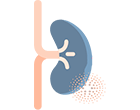Liddle Syndrome Precision Panel
Liddle syndrome is a genetic disorder characterized by low-renin hypertension that appears early in life. It is caused by mutations affecting the epithelial sodium channel (ENaC) located in the collecting duct of the nephron.




